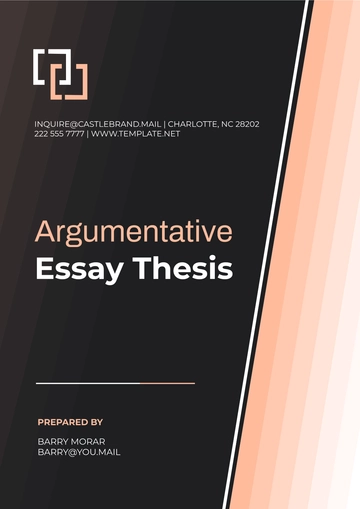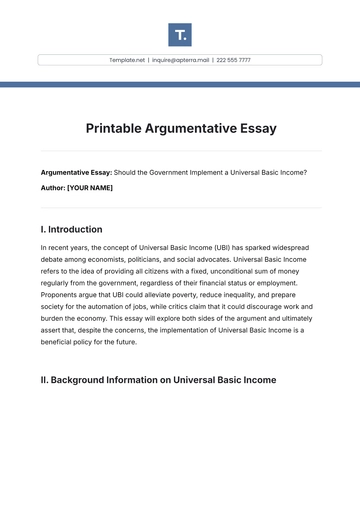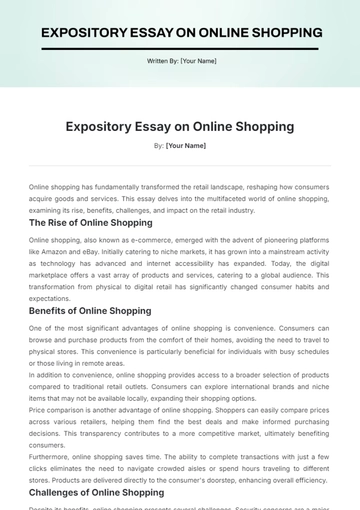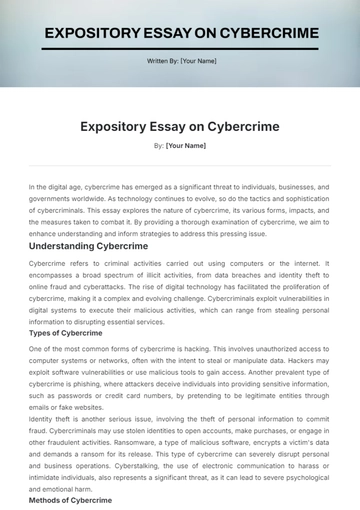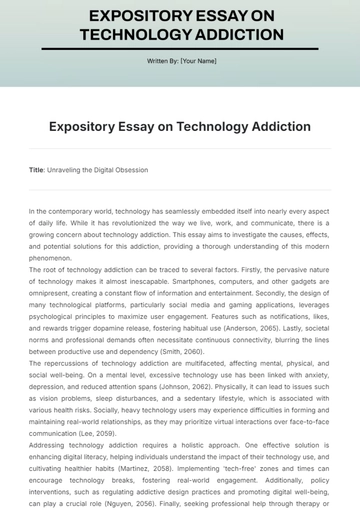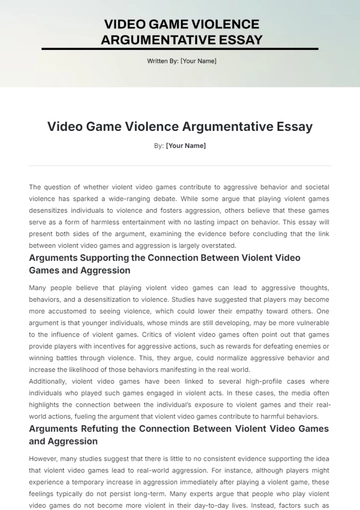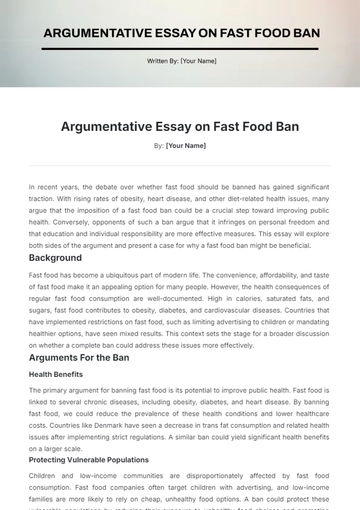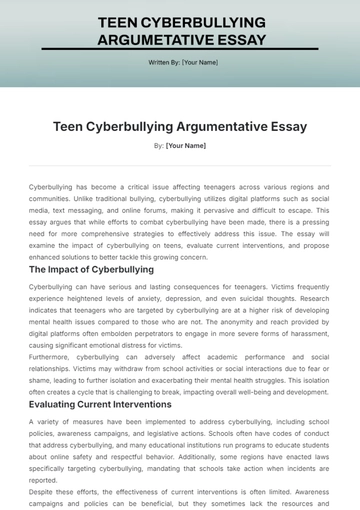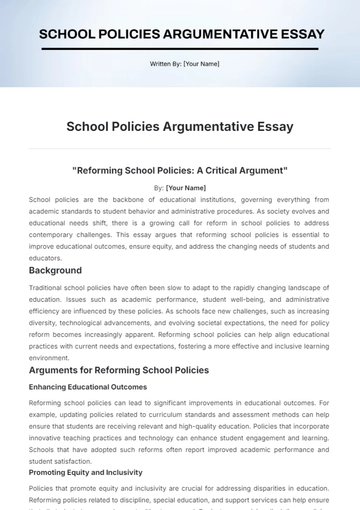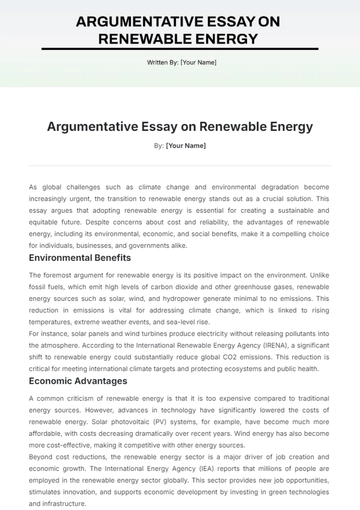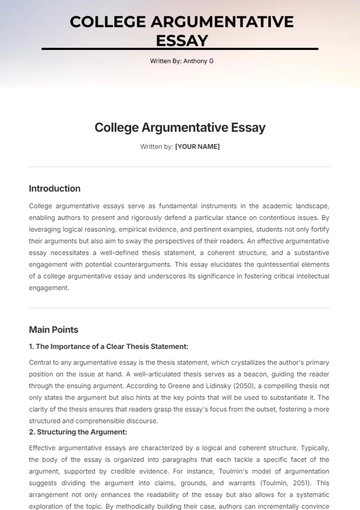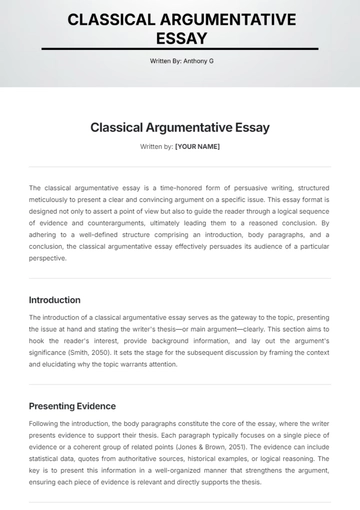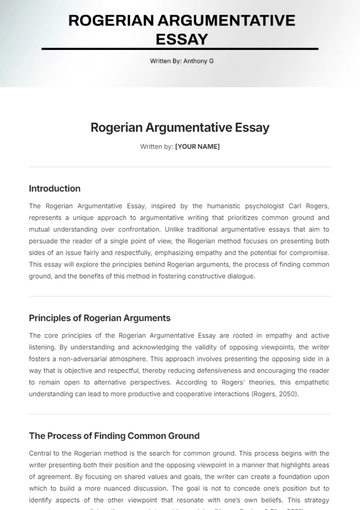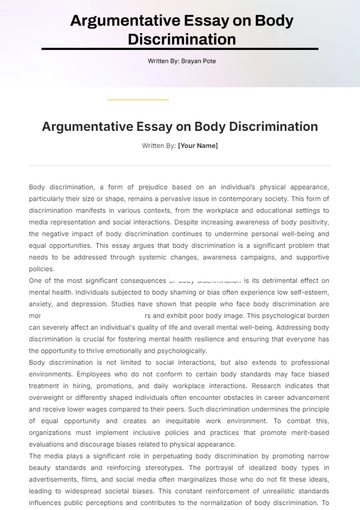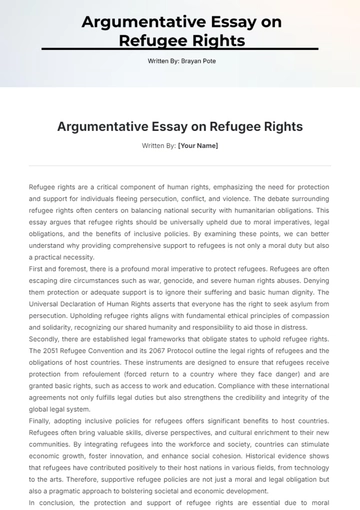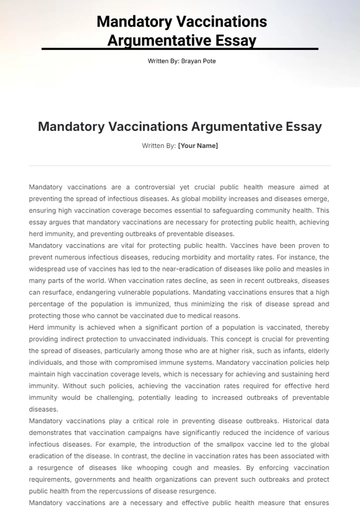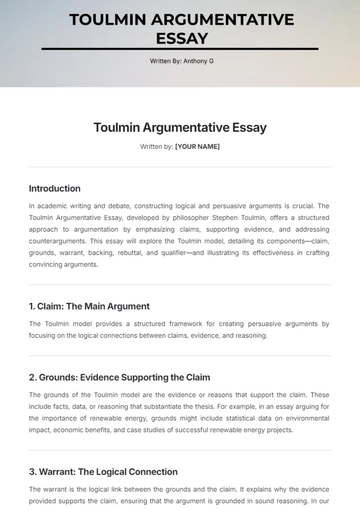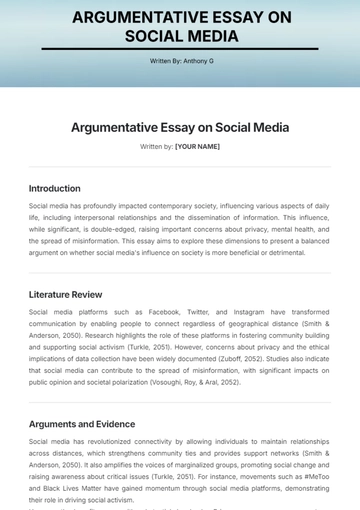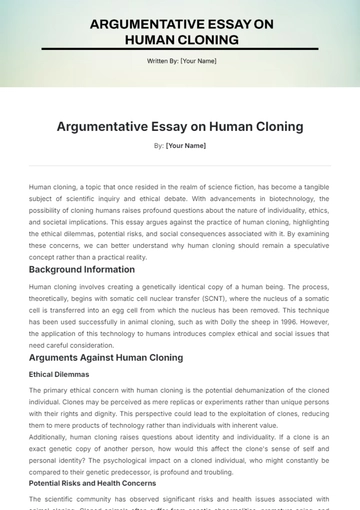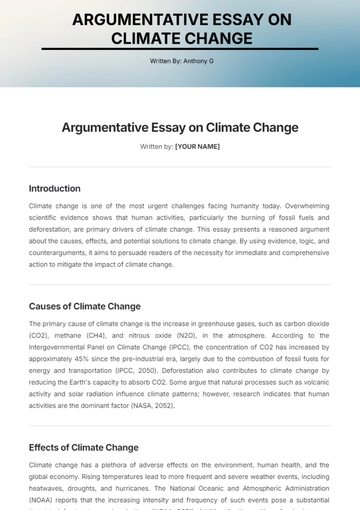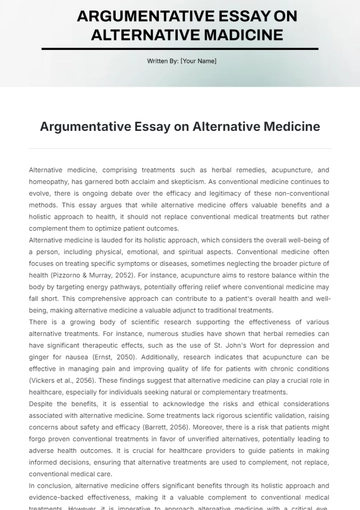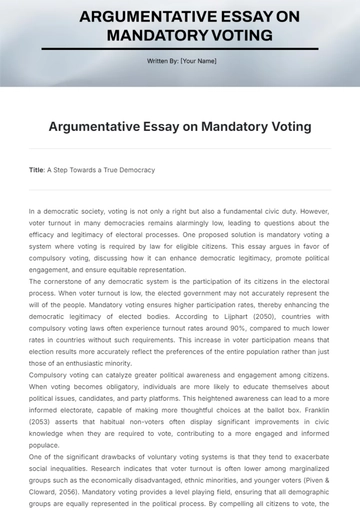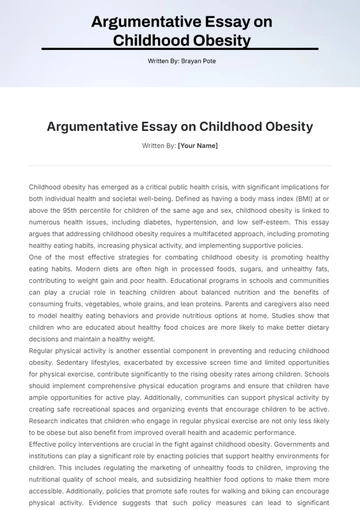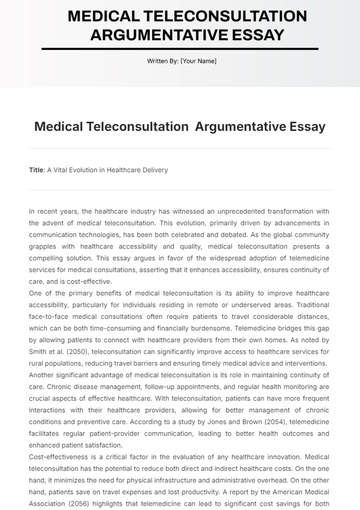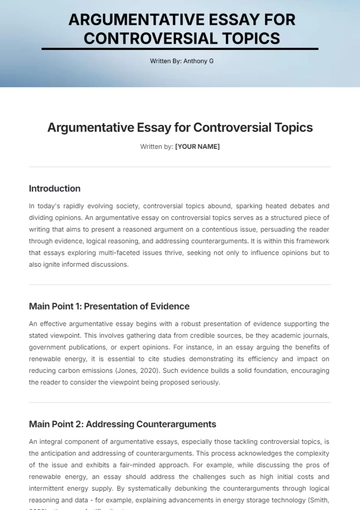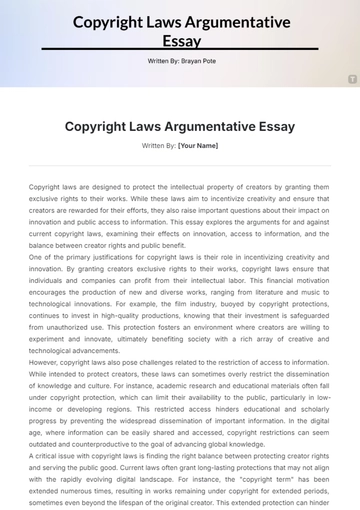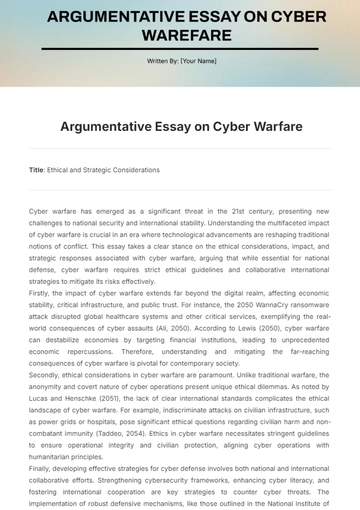Free Printable Argumentative Essay
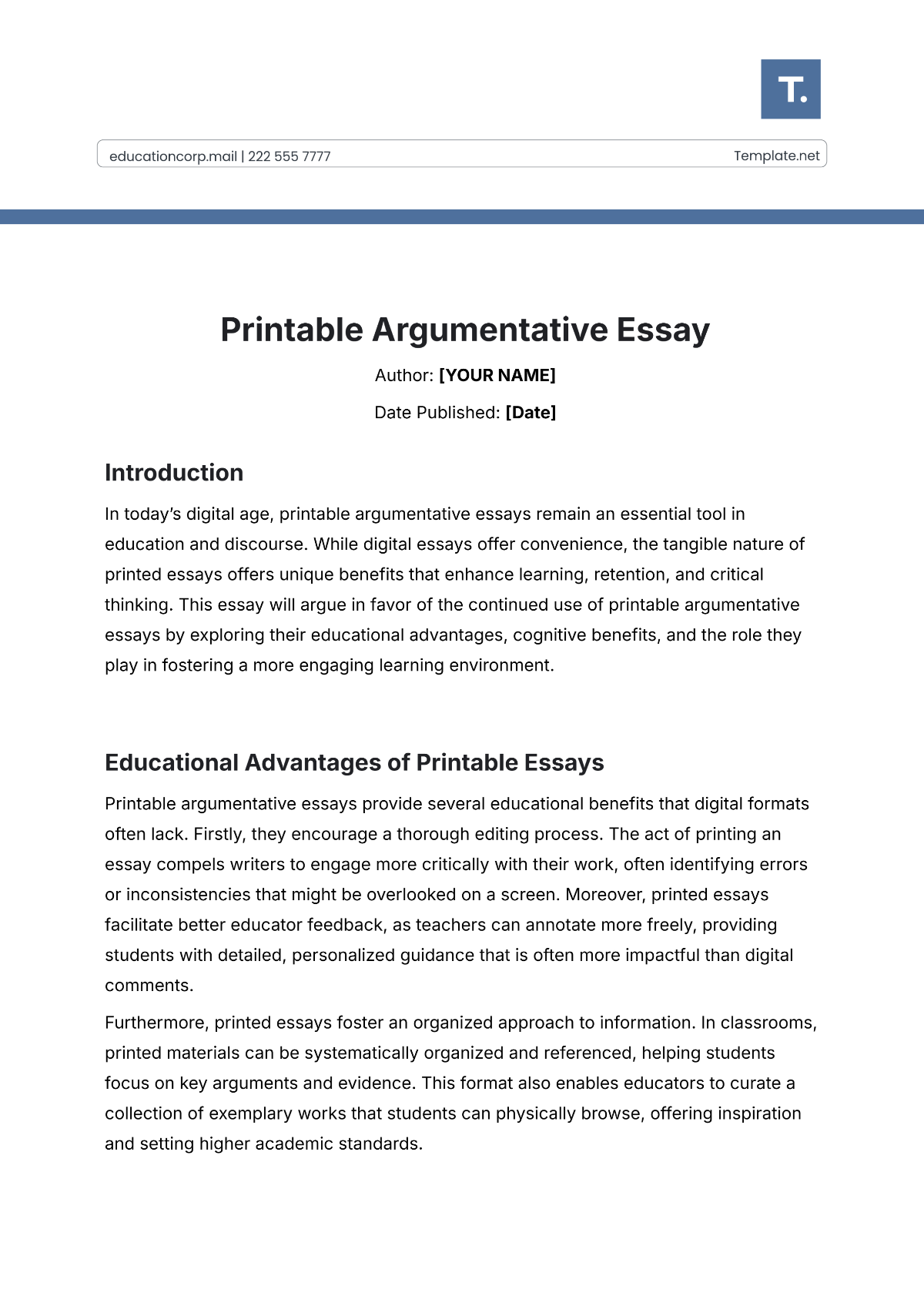
Argumentative Essay: Should the Government Implement a Universal Basic Income?
Author: [YOUR NAME]
I. Introduction
In recent years, the concept of Universal Basic Income (UBI) has sparked widespread debate among economists, politicians, and social advocates. Universal Basic Income refers to the idea of providing all citizens with a fixed, unconditional sum of money regularly from the government, regardless of their financial status or employment. Proponents argue that UBI could alleviate poverty, reduce inequality, and prepare society for the automation of jobs, while critics claim that it could discourage work and burden the economy. This essay will explore both sides of the argument and ultimately assert that, despite the concerns, the implementation of Universal Basic Income is a beneficial policy for the future.
II. Background Information on Universal Basic Income
Universal Basic Income is not a new idea. It has roots in various social and economic theories dating back to the 16th century. More recently, the idea has gained traction due to advancements in automation and the growing wealth gap between the rich and the poor. Some countries, such as Finland and Canada, have conducted pilot programs to test the effectiveness of UBI in reducing poverty and unemployment, though the results have been mixed. In Finland's 2057–2058 UBI trial, participants received €560 a month, which improved their well-being but did not significantly increase employment rates (Kangas et al., 2059).
III. Arguments in Favor of Universal Basic Income
Poverty Reduction and Economic Security
One of the primary arguments for UBI is its potential to reduce poverty and provide economic security for all citizens. With a guaranteed income, individuals would have the financial means to meet their basic needs, such as housing, food, and healthcare. This could especially benefit marginalized groups, including those with disabilities, elderly citizens, and low-income workers. According to a study by the Roosevelt Institute (2060), implementing UBI in the United States could lift approximately 30 million people out of poverty, ensuring a minimum standard of living for everyone.Promotion of Economic Mobility
UBI can also encourage economic mobility by giving individuals the freedom to pursue education or start businesses without the constant fear of financial ruin. When people are not living paycheck to paycheck, they have more flexibility to take risks, innovate, and invest in their futures. This could lead to greater entrepreneurial activity and a more dynamic economy. A study by the Economic Policy Institute (2061) found that individuals who receive unconditional financial support are more likely to pursue higher education or engage in small-scale entrepreneurial ventures, both of which contribute to long-term economic growth.Automation and Job Displacement
With increasing automation, many jobs are becoming obsolete. Automation has the potential to displace workers in industries such as manufacturing, retail, and transportation. According to a report by the McKinsey Global Institute (2057), up to 800 million jobs could be lost globally due to automation by 2070. UBI could act as a safety net, ensuring that individuals who lose their jobs due to automation have a basic income to fall back on while they transition to new industries or reskill for emerging job markets.
IV. Arguments Against Universal Basic Income
Disincentive to Work
Critics of UBI argue that it could discourage people from working. If individuals receive money without the requirement of employment, some may choose not to work at all, leading to a decrease in the overall labor force. This could harm the economy by reducing productivity and economic output. A study by the Cato Institute (2061) found that in basic income trials, while most participants continued to work, a small percentage did opt out of the workforce. However, it should be noted that these trials were limited in scope and did not account for long-term economic behaviors.Economic Feasibility
Another major criticism is the economic feasibility of UBI. The cost of providing a universal basic income to every citizen could be astronomical. Funding such a program would require significant tax increases or cuts in other government services, potentially placing a heavy burden on taxpayers. According to the Tax Policy Center (2060), implementing a UBI of $1,000 per month for every American would cost the government an estimated $3 trillion annually. Some argue that the money used to fund UBI could be better allocated toward targeted welfare programs that focus on those most in need, rather than distributing funds equally to everyone.Inflation Concerns
Critics also fear that the introduction of UBI could lead to inflation. If everyone receives additional money without an increase in the supply of goods and services, demand could outpace supply, leading to price increases. This could undermine the effectiveness of UBI, as the additional income may not translate to greater purchasing power. A study by the National Bureau of Economic Research (2062) suggests that while inflation is a concern, careful implementation and coordination with fiscal policies could mitigate such effects.
V. Rebuttal to Criticisms
While the concerns about disincentives to work and economic feasibility are valid, they do not fully account for the broader benefits of UBI. Research from the Finnish UBI experiment (Kangas et al., 2059) indicates that in countries where UBI has been tested, the majority of recipients continued to work, and some even pursued more fulfilling or socially beneficial jobs. As for economic feasibility, proponents of UBI suggest that the program could be funded through progressive taxation, a reduction in bureaucracy, and the long-term economic benefits of a healthier, more productive workforce. Moreover, the potential to reduce poverty and inequality could result in a stronger and more stable economy in the long run.
VI. Conclusion
In conclusion, the implementation of Universal Basic Income offers a promising solution to several pressing social and economic issues, including poverty, job displacement due to automation, and economic inequality. While the policy is not without its challenges, such as concerns about disincentives to work and the feasibility of funding the program, the potential benefits of UBI outweigh these drawbacks. As society continues to evolve, particularly in response to technological advances, it is crucial to explore innovative policies like UBI that can ensure economic security and opportunity for all citizens.
VII. References
Kangas, O., Launiainen, M., & Raittilu, M. (2059). The Finnish Basic Income Experiment 2057–2058: Preliminary Results. Finnish Ministry of Social Affairs and Health.
McKinsey Global Institute. (2057). A Future That Works: Automation, Employment, and Productivity.
Roosevelt Institute. (2060). Universal Basic Income: A Smart Economic Policy.
Tax Policy Center. (2060). The Cost of Universal Basic Income.
National Bureau of Economic Research. (2062). Inflationary Effects of Basic Income Programs.
Economic Policy Institute. (2061). How Basic Income Can Foster Entrepreneurial Activity.
Cato Institute. (2061). The Impact of Basic Income on Work Incentives: A Review of Pilot Programs.
- 100% Customizable, free editor
- Access 1 Million+ Templates, photo’s & graphics
- Download or share as a template
- Click and replace photos, graphics, text, backgrounds
- Resize, crop, AI write & more
- Access advanced editor
Elevate your essay-writing process with Template.net's Printable Argumentative Essay Template! This customizable, editable template guides you in structuring persuasive arguments effectively. Seamlessly adapt each section to your topic using our AI Editable Tool, ensuring clarity and cohesion. Perfect for students and professionals alike, this template simplifies planning and enhances your writing quality. Download, customize, and succeed!
